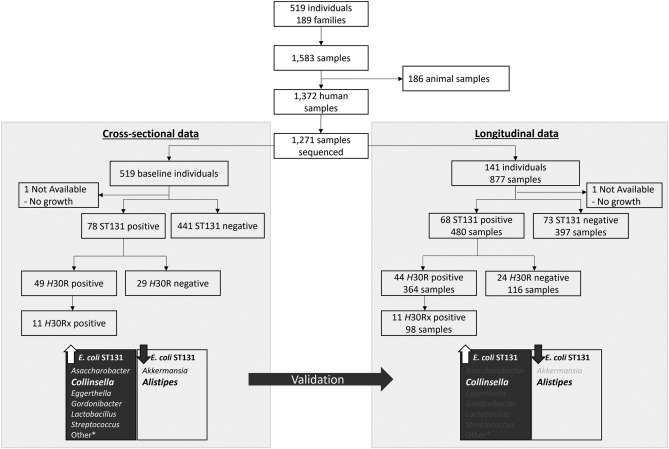💡 This study investigates the gut microbiome’s role in the carriage of 𝘌𝘴𝘤𝘩𝘦𝘳𝘪𝘤𝘩𝘪𝘢 𝘤𝘰𝘭𝘪 sequence type 131-H30R (ST131-H30R), a global multidrug-resistant pathogen. Through longitudinal fecal swab surveillance, they characterized the fecal microbiome of veterans and their household members, aiming to identify associations between specific gut bacterial phyla and genera and ST131-H30R carriage.
𝘌𝘴𝘤𝘩𝘦𝘳𝘪𝘤𝘩𝘪𝘢 𝘤𝘰𝘭𝘪 sequence type 131-H30R (ST131-H30R) is a global multidrug-resistant pathogen, yet the role of the gut microbiome in its intestinal carriage remains unclear. This study aims to characterize the associations between specific gut bacterial phyla and genera and the carriage, persistence, and loss of ST131-H30R, providing potential targets for interventions.
📍 Methods:
Participants, consisting of veterans and their household members, underwent longitudinal fecal swab surveillance from 2014 to 2018. Fecal microbiome characterization involved 16S rRNA qPCR and sequencing. Associations between ST131-H30R carriage and the gut microbiome were assessed through random forest models at baseline and mixed-effects logistic regression in longitudinal analyses.
📍 Key Findings:
📌 Baseline Associations: H30R-positive participants exhibited higher proportional abundances of 𝘈𝘤𝘵𝘪𝘯𝘰𝘣𝘢𝘤𝘵𝘦𝘳𝘪𝘢 phylum, specifically 4.9% vs. 3.1% in ST131-negative participants. 𝘊𝘰𝘭𝘭𝘪𝘯𝘴𝘦𝘭𝘭𝘢 abundance was higher (2.3% vs. 1.1%), while 𝘈𝘭𝘪𝘴𝘵𝘪𝘱𝘦𝘴 abundance was lower (2.1% vs. 2.6%) in H30R-positive participants.
📌 Longitudinal Associations: 𝘊𝘰𝘭𝘭𝘪𝘯𝘴𝘦𝘭𝘭𝘢 abundance correlated positively with ST131-H30R carriage status and negatively with the loss of ST131-H30R.
𝘈𝘭𝘪𝘴𝘵𝘪𝘱𝘦𝘴 corresponded with the loss and persistent absence of ST131-H30R, even in the presence of household exposure.
📌 Potential Intervention Targets: 𝘊𝘰𝘭𝘭𝘪𝘯𝘴𝘦𝘭𝘭𝘢, specifically 𝘊. 𝘢𝘦𝘳𝘰𝘧𝘢𝘤𝘪𝘦𝘯𝘴, associated with ST131 and H30R presence, suggesting it as a potential intervention target. 𝘈𝘭𝘪𝘴𝘵𝘪𝘱𝘦𝘴, negatively associated with H30R prevalence, may be a target for reducing ST131-H30R colonization.
📍 𝘊𝘰𝘭𝘭𝘪𝘯𝘴𝘦𝘭𝘭𝘢, associated with various diseases, demonstrated positive correlations with ST131-H30R, suggesting its potential as an intervention target. In contrast, 𝘈𝘭𝘪𝘴𝘵𝘪𝘱𝘦𝘴, known for anti-inflammatory effects, showed negative associations with H30R, offering another potential target. Future investigations should explore these associations’ causal mechanisms and evaluate interventions, including probiotics and diet modifications.
📍 This study unveils associations between specific gut microbiome components and ST131-H30R carriage, persistence, and loss. 𝘊𝘰𝘭𝘭𝘪𝘯𝘴𝘦𝘭𝘭𝘢 and 𝘈𝘭𝘪𝘴𝘵𝘪𝘱𝘦𝘴 emerge as potential intervention targets, offering avenues for microbiome-based strategies to mitigate the risk of ST131-H30R, a significant multidrug-resistant pathogen.
Link to the article : http://tinyurl.com/4zz86bmp
